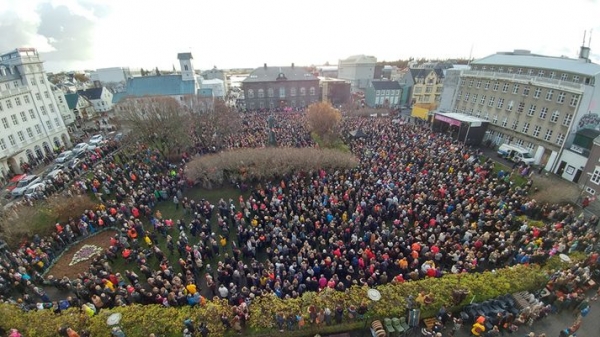Despite the fact that Iceland is celebrated as the most gender-equal country in the OECD, Iceland has not yet achieved full gender equality, and the gender pay gap continues to be very real in Iceland. Fortunately, however, Iceland continues to make important gains on the road to full equality.
Read more: Iceland ranked as most gender equal country in world for the 9th consecutive year
A new report prepared by Statistics Iceland finds that the gender pay gap decreased by a third between 2008 and 2016. The adjusted gender pay gap was 6.6% in 2008 but had dropped down to 4.5% in 2016. The gender pay gap is smaller in the public sector than in the private sector. Women in the public sector were paid on average 5.2% less for the same work as men in 2008, but only 3.3% in 2016. Women working in the private sector were paid 8.1% less than their male counterparts in 2008, but 5.4% in 2008.
The Equal Pay Standard

A new law went into effect on January 1 which requires all companies to certify that they pay their female and male employees the same wages for the same jobs. Iceland has had legislation for years which stipulates that gender cannot be used as a factor in determining compensation. The new law moves the burden of proof onto the employers, rather than the employees, thus ensuring that employers have to take steps to certify that they adhere to absolute gender pay equality.
The legislation will is being phased in gradually. In the first phase the law only applying to large companies and government agencies, but will be extended in coming years. Ultimately all but the smallest businesses will have to make sure they have been certified as adhering to gender pay equality.
Read up on the Icelandic Equal Pay Standard at the site of the Icelandic Women's Rights Association.
Despite the fact that Iceland is celebrated as the most gender-equal country in the OECD, Iceland has not yet achieved full gender equality, and the gender pay gap continues to be very real in Iceland. Fortunately, however, Iceland continues to make important gains on the road to full equality.
Read more: Iceland ranked as most gender equal country in world for the 9th consecutive year
A new report prepared by Statistics Iceland finds that the gender pay gap decreased by a third between 2008 and 2016. The adjusted gender pay gap was 6.6% in 2008 but had dropped down to 4.5% in 2016. The gender pay gap is smaller in the public sector than in the private sector. Women in the public sector were paid on average 5.2% less for the same work as men in 2008, but only 3.3% in 2016. Women working in the private sector were paid 8.1% less than their male counterparts in 2008, but 5.4% in 2008.
The Equal Pay Standard

A new law went into effect on January 1 which requires all companies to certify that they pay their female and male employees the same wages for the same jobs. Iceland has had legislation for years which stipulates that gender cannot be used as a factor in determining compensation. The new law moves the burden of proof onto the employers, rather than the employees, thus ensuring that employers have to take steps to certify that they adhere to absolute gender pay equality.
The legislation will is being phased in gradually. In the first phase the law only applying to large companies and government agencies, but will be extended in coming years. Ultimately all but the smallest businesses will have to make sure they have been certified as adhering to gender pay equality.
Read up on the Icelandic Equal Pay Standard at the site of the Icelandic Women's Rights Association.







